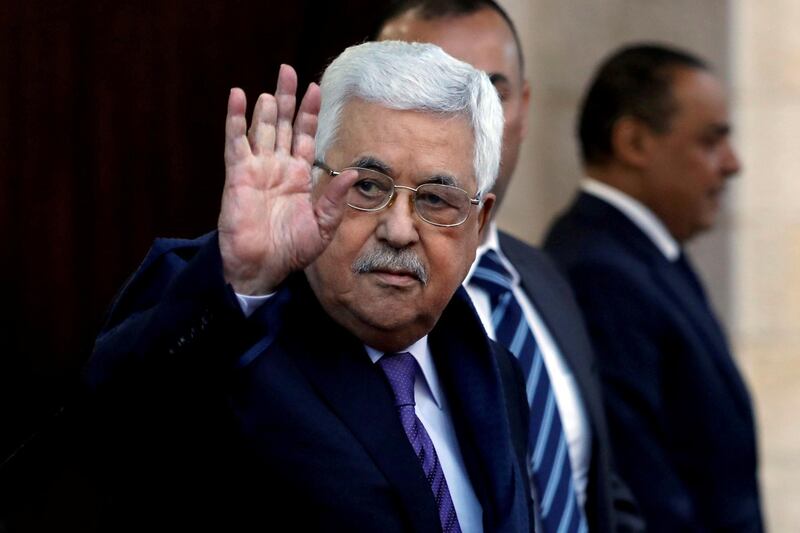The latest health scare, even if it subsides for now, has reinforced concerns that a sudden departure for ailing Palestinian President Mahmoud Abbas is unlikely to be a smooth transition.
The 82-year-old, who has led the Palestinians since Yasser Arafat's death in 2004, was hospitalised for a third time in a week on Sunday. However, sources close to his care on Monday said his condition was improving after being admitted to hospital in Ramallah for inflammation of the lung.
They said his temperature hit 40 Celsius Sunday, but that as a result of intravenous treatment it receded. Last Tuesday, Mr Abbas underwent surgery for an ear infection and subsequently returned to the hospital Saturday for checks before being admitted again Sunday. His recent health history has been marked by a biopsy at a hospital in Maryland in March, according to officials, and he underwent a cardiac catheterization in Oct 2016.
__________
Read more:
Mahmoud Abbas admitted to hospital for third time in a week
US readies Mideast peace plan, but threatens Palestinian aid
Mahmoud Abbas apologises for speech that stirred international criticism
__________
However, his advanced age and faltering health cause concern as he has refrained from grooming a successor out of fear it would diminish his absolute control of the Palestinian Authority. As a result, his departure will likely have a wide felt impact on the Palestinian and international communities.
Abdullah Abdullah, a member of the Palestinian Legislative Council who backs Mr Abbas, on Monday dismissed concerns about stability after Abbas's departure. "It won't be chaotic, because we have a system, a law,” he said. “Things will follow the constitutional process."
But independent observers say there is scant chance of that actually happening. The Palestinian Basic Law stipulates that in case of the president's incapacitation or death, the speaker of the Palestinian Legislative Council serves as acting president for 60 days, during which elections are to be organized. But the speaker of the PLC is a Hamas head, Aziz Dweik, from Hebron in the West Bank.
Fatah, which runs the self-rule enclaves in the West Bank, would likely reject a Hamas leader as the temporary president, while Israel is already making clear it will not tolerate any Hamas advances in the post-Abbas period. Gen. Yaakov Amidror, the former head of Israel's National Security Council, said "We don't intervene in who will rule, that's a Palestinian decision. If they choose someone reasonable it will advance Palestinian interests. If it is someone who is extreme, Israel will have to respond. It depends who they choose."
In the view of Mkhaimar Abusada, a political scientist at Al-Azhar University in Gaza, "Fatah's not accepting the legal transfer of power will leave the door open for chaos, clashes and eruptions of violence because Fatah is not respecting the Basic Law. This will create problems within Fatah itself with everyone believing he is more entitled to the position than the others."
Mr Abusada does not rule out violence among Fatah leaders competing for primacy, including intelligence chief Majid Faraj, former Preventive Security chief Jibril Rajoub and Abbas's number two on the Fatah central committee Mahmoud al-Aloul. "There are groupings and unlike in a democratic system where security personnel are loyal to the country [but] among Palestinians, they are loyal to leaders," Mr Abusada said.
However, Hani Masri, director of the Masarat think-tank in Ramallah estimates that Fatah will more likely than not avoid infighting because its leaders know this will damage the movement and benefit Hamas. Masri believes that the Palestinian Liberation Organization Central Council would choose a temporary president of the Palestinian Authority until elections are held. "I think it can be smooth," he said.
But Khalil Shikaki, head of the Palestinian Centre for Policy and Survey Research in Ramallah, says the succession, under present circumstances of the Fatah-Hamas split which has persisted for more than a decade, is fraught with uncertainty. He said this was not only because Fatah and the Israelis would reject Dweik as interim president, but also because it will be impossible to hold elections without reconciliation and reunification of the West Bank and Gaza. Talks about reconciliation earlier this year collapsed after an assassination attempt on Prime Minister Rami Hamdallah during a visit to Gaza in March.
The PA would be able to function initially without a president, with current prime minister Rami Hamdallah steering policy, Mr Shikaki said. "But this can't continue for a long time. There are a lot of issues the president has traditionally addressed. This would be ad-hoc and without any precedent.
“It's not something that can last more than a few weeks or months. Hamdallah can get away with one or two decisions, but sooner or later it will be necessary to find a system that provides a level of legitimacy,” he said. “Soon things will begin to crack if there is no more permanent and de jure arrangement being made."





